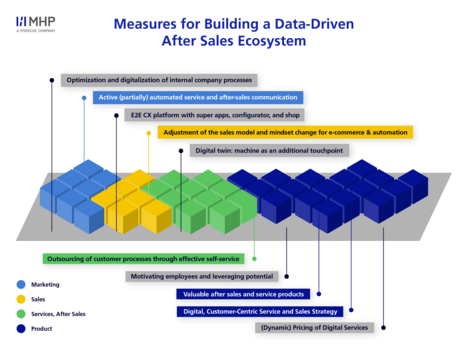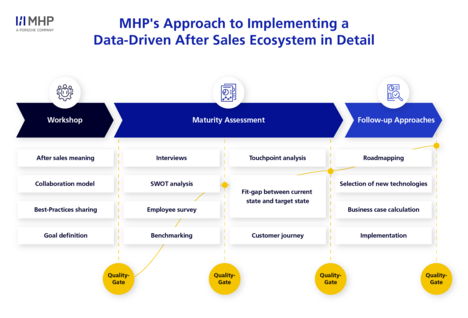
- Blog, Customer Experience & Sales
- Published on: 21.10.2024
- 12:08 mins
Data-Driven After-Sales Strategies: How to Keep Mechanical Engineering Profitable
Increase customer satisfaction through optimized After-Sales Services
The German machine engineering industry is under significant pressure: in an increasingly challenging economic environment, it is losing competitiveness. Long waiting times in service, cumbersome processes, and delivery delays lead to customer dissatisfaction and stagnating revenues. Yet, an effective after-sales service accounts for a significant portion of profits in mechanical engineering. Additionally, the aftermarket sales is four to five times larger than the market for new machine sales. Therefore, it is crucial to optimize the after-sales sector to its full potential.
However, many manufacturers lack insight into the actual machine usage by the customer after the sale, which means valuable revenue opportunities remain untapped. A data-driven, proactive aftermarket sales management approach centered around fully digitized processes, with a focus on customer-centricity, is the solution for securing sustainable revenue streams, even in dynamic times. In this blog post, you will discover how to leverage optimal data usage and a targeted after-sales strategy to strengthen long-term customer retention.
Challenges in After-Sales Management
In the complex field of mechanical engineering, companies face a range of challenges that limit their ability to effectively meet customer needs in after-sales management and secure long-term revenue.
Passive customer interaction
A central problem in mechanical engineering is reactive customer interaction, which only begins when the customer reaches out with a specific concern. Until then, sales and service staff often do not know whether the customer is satisfied and willing to invest further, whether they want to complain about a malfunction, or whether they wish to return the machine. Therefore, the customer and their machine usage after the sale are like a “black box”.
Lack of digitalization
Additionally, deficiencies in digitalization hinder success in the aftermarket sales sector. Many companies in mechanical and plant engineering still operate with outdated IT processes, structures, and infrastructures, making effective data usage nearly impossible. These technological laggings not only prevent timely and targeted customer engagement but also result in valuable data on customer interactions and machine usage remaining unused or even being lost.
Inefficient, inconsistent processes
Additionally, there are significant weaknesses within the processes themselves. Redundancies, repetitions, information losses, and media disruptions in customer inquiries and problem resolution are widespread. A lack of comprehensive, process-oriented digitalization significantly slows down service and leads to higher costs. Customer inquiries are not handled efficiently, which not only diminishes customer satisfaction but also negatively impacts the company's competitiveness.
Strong product focus
Another obstacle is the strong product focus of many companies. Often, the emphasis is placed on selling and perfecting the product and its portfolio, while the actual needs of the customer after the sale are neglected. This leads to low adaptability and prevents companies from proactively addressing the changing requirements of their customers during the product usage period.
Silo mentality
The strong centralization at the operational level also poses a significant problem. There is often a lack of cross-departmental collaboration, and the absence of comprehensive digitalization of processes creates data silos. This silo mentality and the lack of trust in decentralized decision-making hinder quick and customer-oriented responses.
The Solution: Building a Sustainable Data-Driven Aftermarket Sales Ecosystem
To address the challenges of after-sales service in mechanical engineering and fully leverage potential, establishing a data-driven after-sales ecosystem is essential. This ecosystem relies on a digital, customer-centric service and sales strategy that places customer needs at the forefront and is supported by the latest technologies.
Active customer support through customer centricity
A central element of this strategy is the integration of customer data to predict needs and enable proactive support. By analyzing machine data and customer behavior, your company can identify potential service requirements and initiate targeted, tailored after-sales measures. Additionally, you can continuously monitor the condition of machines using digital twins, allowing for the early identification of maintenance needs or potential issues.
Consistent and comprehensive digitalization of processes
Another key to success lies in optimizing, digitalizing, and automating existing process structures. Fully digitalized processes create the foundation for efficient workflows and improved customer interaction. The implementation of an end-to-end CX platform with super apps, spare parts shops, or training platforms enables you to digitally represent and manage the entire customer lifecycle. Additionally, with effective self-services, you can outsource customer processes, thereby realizing automated service and aftermarket sales communication.
Adapted sales strategy for optimal customer value
To ensure that the best solution for the customer is always at the forefront, it is necessary to realign traditional sales models. A compensation model tailored to each use case ensures that sales teams are rewarded based on their performance and the value they provide to the customer.
The transition to e-commerce and automation also opens up new sales opportunities and creates efficiency gains. In this context, digital, value-added after-sales and service products emerge, precisely tailored to the needs of customers, thus offering additional value.
Dynamic licensing models, such as pay-per-use or pay-per-part, which are based on actual customer value and machine usage, are also an integral part of a customer-centric sales management strategy. This not only provides your customers with a flexible and transparent billing system but also allows for better internal cost calculations.
Mindset change and employee empowerment as the foundation for a successful transformation
A successful transition to a data-driven after-sales ecosystem also requires a mindset change and targeted employee empowerment. This involves questioning and breaking down existing structures and ways of working. By building relevant expertise, particularly in the digital realm, you can empower your employees to reorganize their tasks and fully utilize their skills.
Effective change management also helps overcome work silos and promotes cross-departmental collaboration. Additionally, fostering a digital mindset is crucial so that your employees understand the advantages of new digital technologies and are motivated to use them.
The Benefits of a Data-Driven Aftermarket Sales Ecosystem
A data-driven after-sales ecosystem offers numerous advantages that enable companies in mechanical engineering to increase their competitiveness and secure long-term revenue potential:
- Increased customer satisfaction: A data-driven after-sales management system enables you to offer personalized service proactively and at the right time. This not only results in an overall optimized customer experience but also leads to higher customer satisfaction and, ultimately, stronger customer loyalty.
- Increased efficiency: With automated and data-driven processes, you can reduce response times and minimize errors. For example, by using AI-powered chatbots, you can handle service requests more efficiently, leading to both higher service quality and cost savings. Automating certain tasks also allows your employees to focus on value-added activities, further boosting productivity.
- Significant revenue growth: Detailed analysis of customer data enables you to develop targeted cross-sell and upsell offers that are precisely tailored to customer needs. This increases sales opportunities and allows you to monetize existing customer relationships while unlocking new revenue streams. In this way, your company can enhance customer value and sustainably expand your revenue base.
- Realization of sustainability goals: Due to increasing governance and reporting obligations concerning aspects such as product circularity or decarbonization targets, sustainable business models are becoming increasingly relevant. In this regard, the digitalization of your processes allows you to implement various circular strategies. For example, a digitized field service management system that includes route planning and skill matching helps improve your emissions balance and utilize resources more sustainably.
Short excursion: Circular strategies
Circular strategies refer to practices and methods that promote the sustainable use of resources. They follow the 9R principles: Refuse, Reduce, Rethink, Remanufacture, Refurbish, Reuse, Repair, Recycle, and Repurpose, aimed at minimizing waste and keeping materials efficiently within the economic cycle.
Discover exciting best practices in our “GreenTech Made in Germany” study to implement sustainable strategies through digital technologies and benefit from significant efficiency and cost advantages.
How MHP Supports You in Building a Data-Driven After-Sales Ecosystem
To successfully address your company's challenges and fully leverage the opportunities arising from data-driven after-sales services, MHP is an experienced partner with extensive expertise at your side, ensuring you can maximize the benefits of after-sales service.
Comprehensive consulting concept
With a holistic end-to-end consulting approach, MHP offers you comprehensive support at both strategic and operational levels. Our expertise extends from initial conception through detailed planning to the successful implementation of a modern digital aftermarket sales ecosystem tailored specifically to the needs of your company. We implement a value-driven data strategy designed to help you maximize the potential of your data. A dedicated team of agile experts, coaches, strategic consultants, project managers, operational specialists, and programmers supports you in the development, evaluation, and implementation of digital, data-driven processes to enhance the efficiency of your after-sales services.
For instance, we assess various AI-supported bot systems based on your company's individual needs and help you implement the chatbot that fits your use case. Additionally, we assist you in designing and introducing specialized training platforms that utilize spatial computing.
Spatial computing briefly explained
Spatial computing is a technology that enables immersive interaction between digital objects and the physical world through the integration of augmented reality (AR) and virtual reality (VR). Using gestures and voice commands, users can interact directly with their environment, opening up various application possibilities in employee empowerment, as well as in product development and customer service.
If you want to learn more about how it works and potential use cases, read our spatial computing blog post.
Years of experience and expertise
Thanks to our extensive experience in the automotive industry, we bring proven best practices and deep expertise that we apply to the machinery sector. Just like automobiles, machines have also undergone an evolution – albeit on a different timeline. For this reason, the automotive industry has been a pioneer in after-sales management for decades, producing numerous innovations that are now highly beneficial for the machinery sector. MHP excels at adapting these valuable insights and applying them to the specific needs of the machinery sector. With numerous clients in machinery, manufacturing, and other industries, we possess comprehensive project experience to support you step by step in realizing your data-driven after-sales ecosystem.
Strong partnerships with global players
Our strong partnerships with leading technology providers such as SAP, AWS, ServiceNow, Salesforce, Microsoft, Siemens, and Spryker enable us to offer you tailored solutions. These collaborations ensure that you have access to the latest technologies and platforms necessary for effective, data-driven aftermarket sales management.
3 steps to a data-driven after-sales ecosystem
MHP follows a systematic and structured approach to assist you in building a data-driven after-sales ecosystem:
- Analysis and definition of problem and target state: To determine where your current after-sales processes, products, and technologies stand in relation to market requirements, we first conduct a detailed gap analysis. This involves examining and assessing the existing after-sales product portfolio to identify potentials, areas for optimization, and target aspirations.
- Development of a customized roadmap: Using a roadmap, we ensure that all after-sales measures align with your overarching business goals. This includes all necessary steps, from selecting the appropriate technologies and systems to adapting the IT infrastructure to sustainably enhance customer satisfaction.
- Support for implementation into your existing structures: We assist you in the introduction of new digital services, ensuring that they can be seamlessly integrated into your existing structures.
The importance of a data-driven strategy in practice: TRUMPF’s data integration platform
Our client TRUMPF demonstrates that digital, data-driven processes are not only promising in aftermarket sales but that a holistic data-driven strategy offers real added value. By implementing a data integration platform, the engineering company was able to optimize its service processes, reduce IT costs, and establish new digital services and business models.
Would you like to learn how TRUMPF succeeded in centralizing its data? Visit our website to find out how MHP supported the realization of the data integration platform at TRUMPF.
Conclusion: Unlock the Full Potential of Your Aftermarket Sales Business with MHP!
A data-driven after-sales ecosystem is essential for companies in the mechanical engineering sector to thrive in an increasingly competitive and dynamic market environment. By strategically utilizing customer data and continuously digitizing and automating processes, your company can improve efficiency, increase customer satisfaction, and unlock new revenue potential. The integration of such data-driven strategies not only allows you to better meet your customers' needs but also promotes sustainable business models that address growing environmental and social responsibility demands.
However, transitioning to a digital and data-driven after-sales ecosystem is not a simple process and requires deep expertise and a strategic approach. This is where MHP comes in: With our comprehensive consulting services and in-depth industry knowledge, we support you in revolutionizing your after-sales strategy and sustainably strengthening your market position. Feel free to contact us directly to embark on a successful and future-proof after-sales transformation together.
FAQ
Service and aftermarket sales are crucial for machinery and plant manufacturers as they represent a substantial portion of profits in mechanical engineering. Therefore, these areas have a major financial impact on the overall business. Additionally, they enable stronger customer retention and offer great potential for revenue growth in a market that is considerably larger than the one for new machine sales and manufacturing sales.
In after-sales service, strategies such as data-driven management and proactive customer support can be employed to identify service requirements early and respond accordingly. Key areas of application include the digitization of processes, integration of customer data, and the development of flexible, customer-oriented solutions such as pay-per-use or pay-per-part models.
After-sales management refers to the strategic planning and optimization of all activities after the sale to maximize revenue and strengthen customer loyalty. After-sales service encompasses specific services such as maintenance and repairs, while after-sales marketing focuses on all efforts aimed at nurturing customer relationships and leveraging additional sales opportunities.
A data-driven after-sales ecosystem is a digitized, customer-centric system that relies on the analysis of customer data to make service processes more efficient and proactively respond to customer needs. It enables your company to maximize revenue potential through targeted, data-driven strategies and strengthen customer loyalty.







